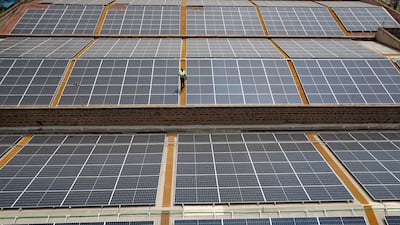As energy prices soar in industrialised nations, the more affordable Middle East and Africa are stepping up as key players in the global digital economy. While cheap energy is proving highly attractive to multinationals, it's a combination of bolstering strong regulatory frameworks, and unwavering commitments to cybersecurity that will keep them invested.
This year demonstrated the growing commitment of multinationals to AI in the region, particularly in Gulf states.
The announcement of money manager BlackRock’s $30 billion investment fund in September, in collaboration with tech giant Microsoft and Abu Dhabi-backed investment group MGX, highlights the growing role these regions are playing in shaping the future of artificial intelligence and data infrastructure.
The fund aims to address the energy-hungry demands of technologies like AI, which are pushing traditional power grids to their limits. According to Goldman Sachs, data centres driven by AI workloads are projected to consume 8 per cent of US electricity by 2030, up from 3 per cent in 2022.
With relatively lower cost energy and expanding infrastructure, the Middle East and Africa are positioning themselves as the next big digital hubs. However, sustaining this momentum will require addressing challenges that renewables still face, such as energy reliability, narrowing infrastructure gaps and maintaining regulatory stability.
AI systems, especially large language models (LLMs), demand staggering amounts of electricity. For instance, training a single LLM like GPT-3 can consume the equivalent electricity of an average American household for 120 years. High per-capita income nations, already grappling with skyrocketing energy prices, are struggling to support AI’s staggering energy demands.
This is where the Gulf region and parts of Africa have a clear advantage. Countries like Saudi Arabia, Qatar and the UAE provide relatively cheap, abundant energy and have heavily invested in infrastructure and real estate, with ample land for development. These factors make them attractive destinations for companies looking to expand their AI and data operations.
Qatar’s telecom giant Ooredoo is investing $1 billion over the next few years to build data centres capable of delivering 120 megawatts of capacity, roughly half of the region’s current capacity. Meanwhile, the UAE has already secured commitments from tech giants like Microsoft, which has launched cloud data centres in Dubai and Abu Dhabi.
Africa is also catching attention. Microsoft and Abu Dhabi-based AI firm G42 are channelling $1 billion into a green data centre in Kenya, designed to support AI models for local languages like Swahili. These projects underscore the regions’ ambitions to establish themselves as key players in the digital economy.
Renewable energy is at the heart of this transformation, with solar power leading the charge. In 2023, Africa added approximately 3.7 gigawatts of new solar capacity, marking a significant leap from previous years. By the end of 2023, the Middle East’s solar capacity had surpassed 16 gigawatts and is projected to reach 23 gigawatts by the end of this year.
However, scaling up renewables to meet the massive energy demands of AI requires significant upfront investments in infrastructure, maintenance and planning.
While lower cost solar panels from China have reduced initial costs, challenges such as the intermittency of solar power, reliance on stable grids and the need for energy storage persist. Without large-scale batteries or hybrid energy systems, solar projects may fall short of providing consistent energy for AI and data centres.
Geopolitical and regulatory hurdles add another layer of complexity. The EU’s General Data Protection Regulation (GDPR) imposes stringent requirements on the transfer of personal data outside the European Economic Area (EEA). Non-EEA countries must meet strict data protection standards or implement safeguards.
Additionally, several Middle Eastern countries enforce data localisation laws. For instance, Saudi Arabia’s Personal Data Protection Law mandates data controllers to store personal data on local servers unless specific conditions are met. Similarly, Bahrain’s regulations permit international data transfers only under certain conditions, such as obtaining consent from data owners.
These requirements, while promoting security, can pose significant challenges for western companies seeking to relocate or expand operations in the region.
Concerns over data misuse and what some refer to as “data colonialism” could hinder progress without these safeguards.
Energy reliability remains a critical issue, too, particularly in countries like South Africa, where rolling blackouts complicate large-scale digital projects.
Meanwhile, climate-related challenges in the Middle East, such as rising temperatures, heatwaves and water scarcity, exacerbate pressures on energy infrastructure, increasing demand for electricity and straining power grids.
Addressing these gaps will require collaboration between governments and private investors. Public investment will be essential to build the grids, roads and power systems needed for sustained growth. . In a positive development, several Arab countries were expected to sign a landmark electricity trading agreement recently, enhancing energy efficiency and reducing blackout risks in the wider MENA region.
However, there are other risks.
If demand shifts or investments dwindle, regions could face costly stranded assets. Additionally, stricter regulations around energy consumption and data sovereignty could impact the viability of data centres.
For businesses, the takeaway is clear: regions that can balance cost, reliability and regulatory stability will support the next wave of advancements and applications of AI that are expected to transform industries, economies and everyday life.
The Middle East and Africa are proving to be priority candidates as global energy costs continue to rise, but the question remains whether they can continue their momentum as opportune environments in the years to come.
Simon J Evenett is the professor of Geopolitics and Strategy at IMD Business School and co-chairman of the World Economic Forum Trade & Investment Council and José Parra Moyano is the professor of Digital Strategy at IMD

